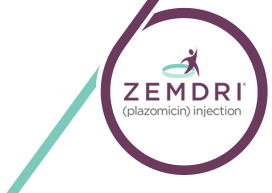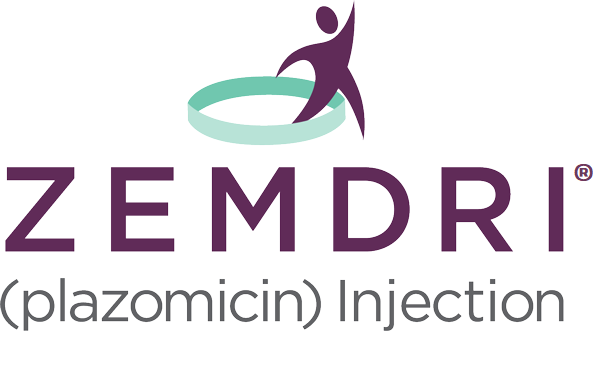Indications & Usage
ZEMDRI® (plazomicin) injection is indicated in patients 18 years of age or older for the treatment of complicated urinary tract infections (cUTI), including pyelonephritis caused by the following susceptible microorganism(s): Escherichia coli, Klebsiella pneumoniae, Proteus mirabilis, and Enterobacter cloacae.
As only limited clinical safety and efficacy data for ZEMDRI are currently available, reserve ZEMDRI for use in cUTI patients who have limited or no alternative treatment options.
To reduce the development of drug-resistant bacteria and maintain effectiveness of ZEMDRI and other antibacterial drugs, ZEMDRI should be used only to treat infections that are proven or strongly suspected to be caused by susceptible microorganisms.
Important Safety Information
BOXED WARNINGS: NEPHROTOXICITY, OTOTOXICITY, NEUROMUSCULAR BLOCKADE AND FETAL HARM
- Nephrotoxicity has been reported with ZEMDRI. The risk of nephrotoxicity is greater in patients with impaired renal function, the elderly, and in those receiving concomitant nephrotoxic medications. Assess creatinine clearance in all patients prior to initiating therapy and daily during therapy. Therapeutic Drug Monitoring (TDM) is recommended for complicated urinary tract infection (cUTI) patients with CLcr less than 90 mL/min to avoid potentially toxic levels.
- Ototoxicity, manifested as hearing loss, tinnitus, and/or vertigo, has been reported with ZEMDRI. Symptoms of aminoglycoside-associated ototoxicity may be irreversible and may not become evident until after completion of therapy. Aminoglycoside-associated ototoxicity has been observed primarily in patients with a family history of hearing loss, patients with renal impairment, and in patients receiving higher doses and/or longer durations of therapy than recommended.
- Aminoglycosides have been associated with neuromuscular blockade. During therapy with ZEMDRI, monitor for adverse reactions associated with neuromuscular blockade particularly in high-risk patients, such as patients with underlying neuromuscular disorders (including myasthenia gravis) or in patients concomitantly receiving neuromuscular blocking agents.
- Aminoglycosides, including ZEMDRI, can cause fetal harm when administered to a pregnant woman.
Contraindications
ZEMDRI is contraindicated in patients with known hypersensitivity to any aminoglycoside.
Additional Warnings and Precautions
Nephrotoxicity
- Nephrotoxicity has been reported with the use of ZEMDRI. Most serum creatinine increases were ≤1 mg/dL above baseline and reversible.
- Serum creatinine increases of 0.5 mg/dL or greater above baseline occurred in 7% (21/300) of ZEMDRI-treated patients compared with 4% (12/297) of meropenem-treated patients. These increases mainly occurred in patients with CLcr ≤90 mL/min and were associated with a plazomicin trough level (Cmin) greater than or equal to 3 mcg/mL.
- Assess CLcr in all patients prior to initiating therapy and daily during therapy with ZEMDRI, particularly in those at increased risk of nephrotoxicity, such as those with renal impairment, the elderly, and those receiving concomitant potentially nephrotoxic medications. In the setting of worsening renal function, the benefit of continuing ZEMDRI should be assessed.
- Adjust the initial dosage regimen in cUTI patients with CLcr ≥15 mL/min and <60 mL/min. For subsequent doses, TDM is recommended for patients with CLcr ≥15 mL/min and <90 mL/min.
Ototoxicity
- Ototoxicity, manifested as hearing loss, tinnitus, and/or vertigo, has been reported with
ZEMDRI. Symptoms of aminoglycoside-associated ototoxicity may be irreversible and may not
become evident until after completion of therapy.
- Aminoglycoside-associated ototoxicity has been observed primarily in patients with a family
history of hearing loss (excluding age-related hearing loss), patients with renal impairment, and
in patients receiving higher doses and/or for longer periods than recommended.
- Cases of ototoxicity with aminoglycosides have been observed in patients with certain variants in the
mitochondrially encoded 12S rRNA gene (MT-RNR1), particularly the m.1555A>G variant. Ototoxicity
occurred in some patients even when their aminoglycoside serum levels were within the recommended
range. In case of known maternal history of ototoxicity due to aminoglycoside use or a known
mitochondrial DNA variant in the patient, consider alternative treatments other than aminoglycosides
unless the increased risk of permanent hearing loss is outweighed by the severity of infection and lack of
safe and effective alternative therapies. The benefit-risk
of ZEMDRI therapy should be considered in these patients.
Neuromuscular Blockade
- Aminoglycosides have been associated with exacerbation of muscle weakness in patients with underlying neuromuscular disorders, or delay in recovery of neuromuscular function in patients receiving concomitant neuromuscular blocking agents. During therapy with ZEMDRI, monitor for adverse reactions associated with neuromuscular blockade, particularly in high-risk patients, such as patients with underlying neuromuscular disorders (including myasthenia gravis) or those patients concomitantly receiving neuromuscular blocking agents.
Fetal Harm
- Aminoglycosides, including ZEMDRI, can cause fetal harm when administered to a pregnant woman. Aminoglycosides cross the placenta, and streptomycin has been associated with several reports of total, irreversible, bilateral congenital deafness in pediatric patients exposed in utero. Patients who use ZEMDRI during pregnancy, or become pregnant while taking ZEMDRI should be apprised of the potential hazard to the fetus.
Hypersensitivity Reactions
- Serious and occasionally fatal hypersensitivity (anaphylactic) reactions have been reported in patients receiving aminoglycoside antibacterial drugs. Before therapy with ZEMDRI is instituted, careful inquiry about previous hypersensitivity reactions to other aminoglycosides should be made. A history of hypersensitivity to other aminoglycosides is a contraindication to the use of ZEMDRI, because cross-sensitivity among aminoglycoside antibacterial drugs has been established. Discontinue ZEMDRI if an allergic reaction occurs.
Clostridium difficile-Associated Diarrhea
- Clostridium difficile-associated diarrhea (CDAD) has been reported for nearly all systemic antibacterial drugs and may range in severity from mild diarrhea to fatal colitis. Treatment with antibacterial drugs alters the normal flora of the colon and may permit overgrowth of C. difficile.
- Careful medical history is necessary because CDAD has been reported to occur more than 2 months after the administration of antibacterial drugs.
- If CDAD is suspected or confirmed, antibacterial drugs not directed against C. difficile may need to be discontinued.
Development of Drug-Resistant Bacteria
- Prescribing ZEMDRI in the absence of a proven or strongly suspected bacterial infection is unlikely to provide benefit to the patient and increases the risk of the development of drug-resistant bacteria.
Adverse Reactions
The most common adverse reactions (≥1% of patients treated with ZEMDRI) are decreased renal function, diarrhea, hypertension, headache, nausea, vomiting and hypotension.
Please see the full Prescribing Information, including BOXED WARNINGS, for additional Important Safety Information.
You may report side effects to the FDA at (800) FDA-1088 or www.fda.gov/medwatch. You may also report side effects to Cipla Therapeutics, a division of Cipla USA, Inc., at (866) 604-3268 or drugsafety@cipla.com

